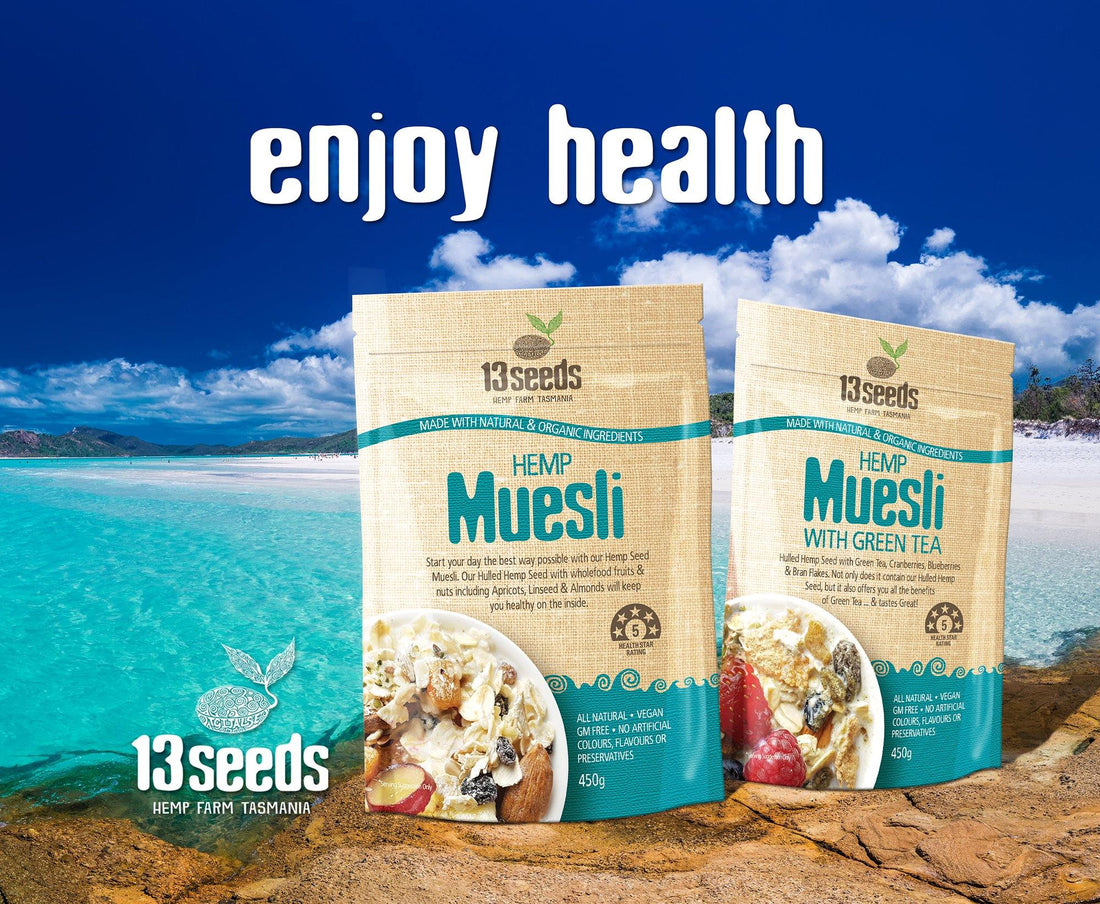The top benefits of Magnesium and why Hemp Seeds can help
It's important to stay healthy so that we can get the most out of our lives. One way in which to ensure this is to provide our bodies with the important nutrients that it requires. Magnesium is a nutrient that offers significant health benefits to us, and, if you're looking at ways in which to incorporate more magnesium into your diet, then we have good news: hemp food can help!
Below we discuss the various benefits that magnesium provides and how hemp seeds can help you achieve your daily recommended dose, especially in comparison to other "health" foods you may be consuming.
Let's begin with the basics:
What is magnesium and why does my body need it?
Magnesium is a mineral that is crucial to the positive functioning of the body. It helps us to keep our blood pressure normal, our heart rhythm steady and our bones strong and healthy.
Did you know that adults who consume less than the recommended amount of magnesium are at a higher risk of developing elevated inflammation markers? This can turn into major health conditions such as type 2 diabetes, heart disease, and even some cancers.
What is the recommended daily amount of Magnesium?
The recommended daily amounts are as follows:
For men: 400 mg/day for those aged nineteen to thirty years old, increasing to 420 mg/day for those aged thirty-one and above.
For women: 310 mg/day, for those aged nineteen to thirty years old, increasing to 320 mg from thirty one and above.
The top benefits of Magnesium
Let's delve specifically into some of the top benefits that Magnesium can bring to our bodies.
1. Helps with insomnia
Magnesium helps to prepare your body for sleep by enabling your muscles to relax. It also helps your mind to "shut off" and calms your nerves by helping to regulate two of your brain’s neurotransmitters that tend to be the culprit that keeps you awake! Magnesium is also essential to maintaining a healthy sleep cycle and “biological clock”.
2. Help boost exercise performance
We exercise to feel good and magnesium can help enhance that. Magnesium helps dispose of lactic acid which can build up during exercise and result in pain. It can also move blood sugar into your muscles for energy for your workout.
3. Reduces high blood pressure
Magnesium plays a vital role in regulating your blood pressure. It relaxes the cells in your arteries and veins so they don't stop the flow of blood. It also helps to regulate other minerals that are vital to blood pressure control and it helps to maintain the delicate balance between potassium and sodium.
4. Improves digestion and improves constipation symptoms
If you don't have enough magnesium in your diet then you cannot digest your food as it's key in your digestive process. This can then lead to constipation, which is one of the most common symptoms of a magnesium deficiency.
5. Help to prevent migraines
Migraine headaches are both debilitating and painful. Vomiting, nausea and sensitivity to both noise and light can often occur. Some research has suggested that those who suffer from migraines are likely to suffer from a magnesium deficiency.
6. Helps fight depression
Magnesium plays a large role in our mood and overall brain function, and low levels are linked to an increased risk of depression. There is a possible link between magnesium deficiency and depression. By increasing the amount of magnesium in your diet, it can help reduce some symptoms of depression in some people.
7. Supports bone health
Research has shown that those who have a higher amount of magnesium in their diet in their food have a higher bone mineral density which is needed to keep your bones healthy, especially for growing bones and healing broken bones.
How do I get more magnesium in my diet?
There are a variety of different ways in which you can increase the amount of Magnesium in your diet. Some people take supplements in the form of tablets, and others eat plant-based foods that are high in magnesium.
Some of these foods are listed below, including their magnesium content.
Dark chocolate: 64 mg in a 1-ounce (28-gram) serving
Avocados: One medium avocado provides 58 mg of magnesium
Nuts: Specific variations of nuts that are magnesium-rich include, cashews, almonds and Brazil nuts. For example, a 1-ounce (28-gram) serving of cashews contains 82 mg of magnesium
Tofu: A 3.5-ounce (100-gram) serving has 53 mg of magnesium
Legumes: One cup serving of cooked black beans contains an impressive 120 mg of magnesium
Banana: One large banana packs 37 mg.
These foods certainly showcase good statistics, but there is one source that's missing on that list, and it contains the highest amount of magnesium by far: hemp seeds. Hemp is a great source of plant-protein, magnesium, omega fatty acids, calcium, and zinc. 1 ounce (28 grams) of hemp seeds contains a whopping 300 milligrams of magnesium!
It's super easy to incorporate hemp food and hemp's seeds into your everyday diet. Below we list some popular ideas.
Hemp Chai Powder
Hemp Honey
Hemp Porridge
Hemp Drinking Chocolate
Hemp Protein Powder
Hemp oil
If you're not keen on the idea of hemp food products, then you can always try these ideas for incorporating specific hemp seeds.
- Throw in a healthy salad
- Healthy cookies
- Make pesto sauces
- Add in homemade granola
- Smoothies
- Sprinkle over cereal
Get more inspiration "https://13seeds.com.au/blogs/news/benefits-of-hemp-seeds-as-a-food" here.
Ensure your health is at its best by choosing magnesium-rich foods containing hemp. Hemp seeds are super healthy and knock all other plant-based foods out of the park when it comes to magnesium content (and more!). Check out "www.13seeds.com.au" 13 Seeds Hemp Farm Tasmania for more information.
Sources and research:
https://www.webmd.com/diet/supplement-guide-magnesium#1
https://draxe.com/7-hemp-seed-benefits-nutrition-profile/
https://www.healthline.com/nutrition/10-foods-high-in-magnesium#section8
https://www.healthline.com/nutrition/10-proven-magnesium-benefits#section3
https://www.ausnaturalcare.com.au/health/life-style/vitamins/health-benefits-of-magnesium








